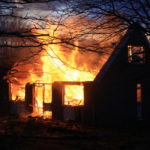Preventing fires in your home.
Did you know that most home fire deaths occur where there is no working fire alarm? Did you also know that most fire deaths occur during prime sleeping hours? Most affected are young children and the elderly because of lack of warning.
With the holidays come more of a chance of an accidental home fire. Make sure your home is prepared to not only warn you in the event of a fire but to prevent a fire all together. Below are tips to preventing fire in your home:
- Smoke Alarms – Install them if you have none, and check the ones you do have. Press the test button once a month and change batteries every year. Smoke alarms older than 10 years are more likely to fail.
- Carbon Monoxide (CO) Alarms – Equally as important as smoke alarms is having a unit that will alert you of high levels of carbon monoxide in the home. Check the unit’s packaging and also with your local fire department to learn more about what constitutes a hazardous CO reading.
- Heating Equipment – Heating equipment is a leading factor in home fires during winter months. Be sure to have furnaces serviced by a reputable inspector, cleaned and maintained each fall before cold weather sets in. When operating portable or fixed space heaters, be conscious to keep them away from items that could ignite, including drapes and articles of clothing.
- Personal Habits – Be conscious of where you are when you do the things you do. Smoking is the leading cause of fire deaths, sending bedding, trash and furniture up in flames. More fires start in the kitchen than any other place in the home, so keep a watchful eye on what you’re cooking.
 Flammables – Ensure that flammables, such as gasoline, kerosene and paints, are kept in proper containers, tightly sealed and stored away from heat and flame. Never store any of those items near a furnace or hot water heater, and be sure to follow manufacturer instructions on storing these types of products.
Flammables – Ensure that flammables, such as gasoline, kerosene and paints, are kept in proper containers, tightly sealed and stored away from heat and flame. Never store any of those items near a furnace or hot water heater, and be sure to follow manufacturer instructions on storing these types of products.- Extinguishers – Many small home fires can be taken care of using a fire extinguisher before they get out of hand. One thing to remember, though, is that extinguishers do not last forever – plan on replacing the unit about every three years.

